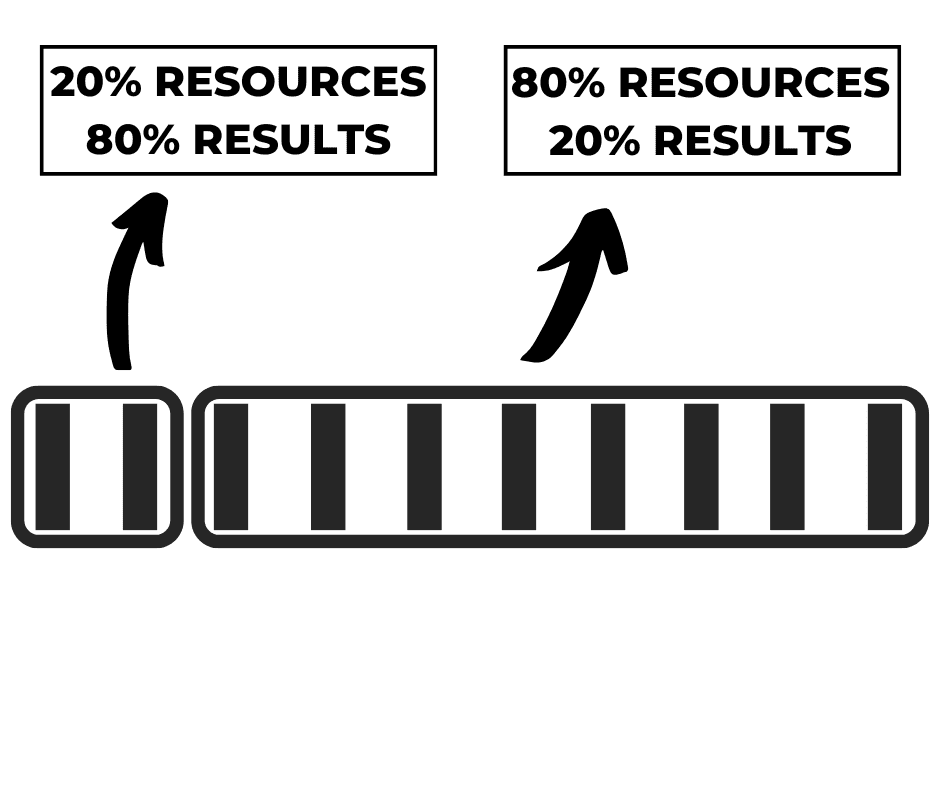About Author
Brett's writing has been featured by outlets like Outreach Magazine, Church Tech Today, and the Unstuck Church Group. Brett's courses on church marketing have over 10,000 students in 143 countries. Brett is also the author of The Digital Ministry: Reaching the ends of the earth without leaving home and is the marketing director at Clickmill.co. Brett has consulted with ministry leaders internationally, helping them create custom marketing strategies that get results. After four years of Christian college, Brett worked at Christian discipleship schools, Christian camps, and was a Youth Ministry Directory at the Salvation Army. He later spent six years in sales and marketing. Through Clickmill, Brett helps ministry leaders implement effective digital marketing strategies so they can reach more people, more effectively. Brett and his wife Siomara live in Honolulu, HI.
80/20 Resource Allocation (Reedited)
Today, I want to share with you a powerful approach to finding asymmetric ministry opportunities that can help you achieve more with less. It’s all about the 80/20 rule, also known as the Pareto Principle.
How do you find asymmetric ministry opportunities?
The easiest way to find these opportunities is to do an 80/20 analysis of every area of your ministry.
The 80/20 rule, otherwise known as the Pareto Principle, states the following:
80% of your ministry’s fruit is generated by 20% of your ministry resources (time, energy, attention, finances).

If you have 10 outreach ministries, you will discover that only 2 of them are bringing in 80% of your new visitors.
If you work 40 hours a week, you will find that just 8 of those hours (20% of your time) are responsible for 80% of the fruit you are currently seeing in your ministry.
At one point Clickmill saw a dramatic drop in new potential clients. We had 0 new leads in four months. Wondering what went wrong, I reviewed the process that every ministry client had gone through to sign with us.
I discovered that they did just 3 things.
- They clicked on a Google Ad
- They downloaded an ebook
- They booked a strategy session
As it turned out, I had quit doing 2 of those 3 things exactly four months prior. I replaced the ebook with a course and began working on Facebook, Twitter, Youtube, and 7 other things instead of running Google Ads. I thought I would get more results by doing more things, but instead, all 10 of my new tasks were producing ZERO fruit.
Upon discovering this, I ruthlessly eliminated every single task that wasn’t producing fruit.
I spent a full week writing a 100+ page ebook that was better than the first one, and launched it on our website.
I updated my Google Ads so they were even more sophisticated than before, and re-enabled them.
Within 48 hours, Clickmill generated over 30 new leads. Even better, I had quit doing the 10 things that were absorbing my entire life, in favor of doing the 2 things that took me almost no time to maintain. I took all the time and energy I was saving, and reinvested it into more fruitful endeavors.
Like me, you’ll find that 20% of things you do generate 80% of your ministry fruit. Eliminate the 80% of unproductive effort, and reinvest it into the activities that produce the most fruit. When you do these things, you will begin to see your ministry grow like you never thought possible.
Take some time with your ministry leaders to do the following:
- 80/20 Time Audit: For 72 hours, track all the things you spend time on as you are doing them – then break these activities into categories and see which percentage of those activities produce the most fruit in your ministry (and your life).
- 80/20 Attention Audit: For 72 hours, track all the things you give attention to – then break these activities into categories and see which percentage of those activities produce the most fruit in your ministry (and your life).
- 80/20 Energy Audit: For 72 hours, track all the things you put physical energy into – then break these activities into categories and see which percentage of those activities produce the most fruit in your ministry (and your life).
- 80/20 Decision Audit: For 72 hours, track which decisions you are making – then break these decisions down into categories and see which percentage of those decisions produce the most fruit in your ministry (and your life).
- 80/20 Finance Audit: For 30 days, track all the things you spend money on – then break these activities into categories and see which percentage of those expenses produce the most fruit in your ministry (and your life).
Personal Examples:
While doing an 80/20 time audit, I discovered that my wife and I spent 2-3 hours a day deciding what to eat, cooking the food, then cleaning up. That’s 14 hours a week. When we ran the numbers, we discovered it was less expensive to hire someone to pre-make all of our meals and free up this time. That’s 728 hours each year, or 30 full days.
While doing an 80/20 time audit I discovered I had over an hour each day of unused time brushing my teeth, doing dishes, driving, etc. I began listening to educational videos during this time to learn the skills I needed to further grow Clickmill. If I had to learn it anyway, why not optimize the time I was already using instead of taking more time out of my schedule? I gain an additional 365 hours of education with this one change.
When my wife and I got married she did an 80/20 finance audit on my spending habits. I discovered that a large portion of my unnecessary expenses was created by my coffee habit. I was spending $300 per month on Starbucks. She quickly bought me a $300 espresso machine and saved us $3,600 per year. Over the last 8 years, this single optimization has saved us around $28,800 – thank you Jesus for my wife! (It also saved time because a trip to Starbucks always took longer than just making it myself.)
In just these three small changes to my life, I increased my yearly income by $3,600, reclaimed 728 hours per year (30 days of my life), and increased my education by 365 hours (15 days) per year. That is fruit! Not only this, but this is only 3 uses of the 80/20 rule in my own life. Imagine what it looks like when you make using these strategies a regular habit.
Outro: By applying the 80/20 rule to your ministry, you can optimize your resources, focus on what truly matters, and witness your ministry grow like never before. Embrace the power of the Pareto Principle and make a lasting impact.
DISCUSSION QUESTION: Now, I’d like to hear from you. Have you applied the 80/20 rule in your ministry? What improvements have you noticed? Share your experiences and insights in the comments below.
VIDEO NOTES CHAT GPT:
[Understanding the 80/20 Rule] The 80/20 rule states that 80% of your ministry’s fruit is generated by 20% of your ministry resources, such as time, energy, attention, and finances. This principle can be applied to various aspects of your ministry to help identify the most fruitful activities and eliminate the unproductive ones.
[Applying the 80/20 Rule in Your Ministry] Let me share an example. When I faced a dramatic drop in new potential clients, I realized that I had stopped focusing on the few activities that had been generating results. So, I eliminated the unproductive tasks and refocused on what worked. Within 48 hours, we generated over 30 new leads, and I had more time to reinvest in fruitful endeavors.
[Conducting 80/20 Audits] I encourage you and your ministry leaders to conduct the following audits:
- 80/20 Time Audit: Track your activities for 72 hours and analyze which activities produce the most fruit in your ministry.
- 80/20 Attention Audit: Similarly, track the things you give attention to for 72 hours and evaluate their impact on your ministry.
- 80/20 Energy Audit: Assess the activities you put physical energy into for 72 hours and determine which ones bring the most value.
- 80/20 Decision Audit: For 72 hours, track your decisions and analyze which ones produce the most fruit in your ministry.
- 80/20 Finance Audit: For 30 days, monitor your expenses and see which ones contribute the most to your ministry’s growth.
[Understanding the 80/20 Rule] The 80/20 rule states that 80% of your ministry’s fruit is generated by 20% of your ministry’s resources, such as time, energy, attention, and finances. This principle can be applied to various aspects of your ministry to help identify the most fruitful activities and eliminate the unproductive ones.
[Applying the 80/20 Rule in Your Ministry] Let me share an example. When I faced a dramatic drop in new potential clients, I realized that I had stopped focusing on the few activities that had been generating results. So, I eliminated the unproductive tasks and refocused on what worked. Within 48 hours, we generated over 30 new leads, and I had more time to reinvest in fruitful endeavors.
[Conducting 80/20 Audits] I encourage you and your ministry leaders to conduct the following audits:
- 80/20 Time Audit: Track your activities for 72 hours and analyze which activities produce the most fruit in your ministry.
- 80/20 Attention Audit: Similarly, track the things you give attention to for 72 hours and evaluate their impact on your ministry.
- 80/20 Energy Audit: Assess the activities you put physical energy into for 72 hours and determine which ones bring the most value.
- 80/20 Decision Audit: For 72 hours, track your decisions and analyze which ones produce the most fruit in your ministry.
- 80/20 Finance Audit: For 30 days, monitor your expenses and see which ones contribute the most to your ministry’s growth.
DISCUSSION QUESTION: Now, I’d like to hear from you. Have you applied the 80/20 rule in your ministry? What improvements have you noticed? Share your experiences and insights in the comments below.


Leave a Reply